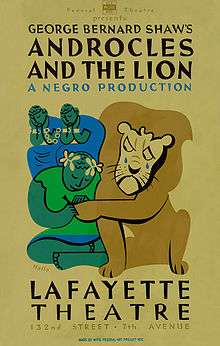Androcles and the Lion (play)
| Androcles and the Lion | |
|---|---|
 1938 Federal Theatre Project production | |
| Written by | George Bernard Shaw |
| Date premiered | 1913 |
| Place premiered | St. James's Theatre, London |
| Original language | English |
| Subject | A Christian is saved by his devotion to an animal |
| Genre | epic pastiche |
| Setting | Ancient Rome |
Androcles and the Lion is a 1912 play written by George Bernard Shaw. The play is Shaw's retelling of the tale of Androcles, a slave who is saved by the requited mercy of a lion. In the play, Shaw portrays Androcles to be one of the many Christians being led to the Colosseum for torture. Characters in the play exemplify several themes and takes on both modern and supposed early Christianity, including cultural clash between Jesus' teachings and traditional Roman values.
Characters
- Androcles (main character)
- The Lion
- Megaera
- Centurion
- Captain
- Lavinia
- Lentulus
- Metellus
- Spintho
- Ferrovius
- Ox-Driver
- Call Boy
- The Editor
- Menagerie Keeper
- Caesar
- Secutor
- Retiariu
Plot
Androcles, a fugitive Christian tailor, accompanied by his nagging wife, is on the run from his Roman persecutors. While hiding in the forest he comes upon a wild lion who approaches him with a wounded paw. His wife runs off. Androcles sees that the cause of the animal's distress is a large thorn embedded in its paw, which he draws out while soothing the lion in baby language.
Androcles is captured and is sent to the Colosseum to be executed with other Christians in gladiatorial combat. They are joined by a new Christian convert called Ferrovius, who struggles to reconcile his Christian principles with his violent inclinations. The Roman captain guarding them is attracted to the genteel convert Lavinia. Eventually the Christians are sent into the arena, but Ferrovius kills all the gladiators before they can harm any Christians. He is offered a job in the Praetorian Guard, which he takes. The Christians are to be released, but the crowd demands blood. To satisfy them, Androcles offers himself to be savaged by lions. But the lion that is supposed to kill him turns out to be the one that Androcles saved, and the two dance around the arena to the delight of the crowd. The emperor comes into the arena to get a closer look, and the lion attacks him. Androcles calls him off and the emperor is saved. He then declares an end to the persecution of Christians. Androcles and his new 'pet' depart together.
Preface
The short play is often printed with a preface that includes a long examination of the Gospels by Shaw, in which Shaw analyzes the Bible and proclaims his findings. In summary, Shaw states that Jesus was a benevolent genius (in areas ranging from moral to social to economic) who eventually bought into popular ideas of his divinity and impending martyrdom. Shaw goes on to state that the teachings of Jesus were lost with his crucifixion, and that the Christian churches that followed are instead based on the teachings and philosophies of Paul or Barabbas. The preface is longer than the play.
Significance
The play was written at a time when the Christian Church was an important influence on society and there was strong pressure on non-believers in public life. The reverse of roles in the play possibly served to evoke empathy from his targeted audience. The characters also represent different "types" of Christian believers. The journey and final outcome of each of the characters make it clear which believers Shaw sympathizes with the most, especially with Lavinia. One of the most famous passages of the play is Lavinia's metaphor of capturing a mouse to converting from Christianity to believing in the Roman gods, where Lavinia shows that the most important part of religion is earnestness and a lack of hypocrisy. Hypocrisy was a characteristic in the Church that Shaw condemned.
The play has themes of martyrdom and persecution which are portrayed through the vehicle of comedy. Another point in the play is his position against vivisection, which connected to his philosophy in being a vegetarian. In the play, Shaw uses slapstick humour, verbal wit and physical humour to portray his themes.
The play became the first book published in the Shavian alphabet when it was released in that orthography by Penguin Books of London in 1962.
Adaptations
A film version, Androcles and the Lion, was made of the play in 1952, produced by Gabriel Pascal. A later film version is from 1984, produced by Ronald Smedley.
A radio version was recorded by BBC Radio and was repeated on BBC Radio 4 Extra on 9 September 2013 with Leslie French playing Androcles.[1]
References
- ↑ "BBC Radio 4 Extra - GB Shaw - Androcles and the Lion". Bbc.co.uk. 2013-09-10. Retrieved 2014-06-08.
External links
| Wikisource has original text related to this article: |
| Wikisource has original text related to this article: |
